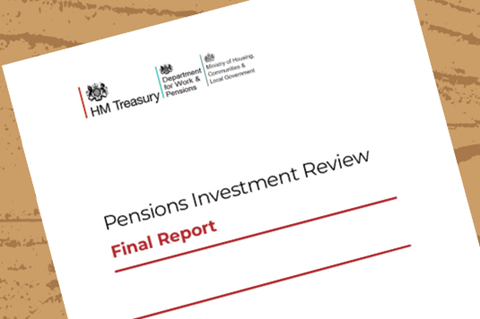The forthcoming Pension Schemes Bill will give the government the power to force pension funds to invest in the UK.
In the Pensions Investment Review, published today (29 May), the government said it was “not necessary currently to mandate investment” in private markets or domestic assets.
This was largely due to the signing of the Mansion House Accord earlier this month, which has seen 17 defined contribution (DC) pension schemes and providers pledge to allocate at least 10% of their default fund assets to private markets, and half of this to the UK.
However, the Pension Schemes Bill will include a “reserve power”, which the government said would enable it to set “quantitative baseline targets for pension schemes to invest in a broader range of private assets, including in the UK, for the benefit of savers and for the economy”.

The Pensions Investment Review explained that the government did not anticipate using the power “unless it considers that the industry has not delivered the change on its own”.
Any intervention would only occur following “a thorough assessment of the potential impacts of any proposed quantitative targets on savers and economic growth”.
In addition, the Pension Schemes Bill is to include “provisions and safeguards” designed to protect the interests of pension savers. The government also said any requirements would be “consistent with the principles of fiduciary duty”.
Could UK investments be mandated if Mansion House Accord flounders?

The Mansion House Accord appears to have been struck with pragmatism and collaboration, but legal experts are already considering what could happen if this collegiate approach breaks down, as Bradley Gerrard reports. Read more
In connection with the government’s work on domestic investment, the Pensions Regulator and the Financial Conduct Authority are due to launch a “market-wide data collection exercise” to record asset allocation data from pension schemes and providers.
Government intervention threat ‘a step too far’
Alison Leslie, head of DC investment services at Hymans Robertson, welcomed the decision not to immediately mandate UK investment, explaining that “those responsible for the arrangements should be given proper authority to invest as they see best for their members”.
“Trustees draw on professional expertise to draw up an investment strategy that will best meet the needs of members, and this should never be overridden by the political priorities of the government of the day.”
Laura Myers, LCP
Investments can include “good private market opportunities already available to them in the UK”, Leslie continued. “These opportunities should stand on their own merits.”
However, Laura Myers, partner and head of DC pensions at LCP, argued that the threat of mandation was “a step too far”.
“Trustees have a crucial role to play in ensuring that pension schemes are run in the interests of their members,” she said.
“Trustees draw on professional expertise to draw up an investment strategy that will best meet the needs of members, and this should never be overridden by the political priorities of the government of the day.
“The industry has already voluntarily entered into various agreements to ensure that proper focus is given to investing in the UK economy and in long-term productive assets, but anything more than this risks losing sight of the primacy of member interests.”

























